Wondering how to do taxes in the United Kingdom? Luckily for the smallest businesses in the UK, His Majesty Revenue & Customs, or HMRC, provides a free basic PAYE tool. You can only use it if you have 10 employees or fewer, though.
Growing companies will need another option that’s recognised by HMRC.
What Matters When Choosing UK Payroll Software
The most important feature of any UK payroll software service is HMRC recognition.
HMRC is a department of the UK Government, and it’s responsible for collecting taxes. It also pays out some types of state support and administers other labor regulations, like the national minimum wage.
The department collects direct taxes like income tax and corporation tax. It also collects indirect taxes, like value-added tax (VAT) and excise duties. And it plays a big role in collecting National Insurance contributions. These fund some of the UK’s welfare benefits, the state pension, and the National Health Service (NHS) in the UK.
HMRC also enforces tax laws to fight tax evasion and non-compliance. It manages customs duty on products entering and leaving the UK, too. It also oversees tax credits that help lower-income households. And finally, HMRC manages the Child Benefit—a payment made to eligible parents or guardians of children.
Formed in 2005, HMRC’s goal is to make tax collection and social support programs more efficient. And in 2013, HMRC introduced the Real Time Information (RTI) system.
RTI changed the timeline for when employers must report employee payments and deductions. Employers can no longer wait to report and pay them at the end of the year. With RTI, employers must submit details about employees’ payments and deductions to HMRC every time they run payroll. UK employers do this via the Pay As You Earn (PAYE) portal.
Why does this matter when it comes to payroll software? Because any HMRC-recognized service will allow for easy RTI reporting too. And that’s exactly what you want.
But there’s more to think about before you choose the right UK payroll software for your business.
6 Factors to Consider When Choosing UK Payroll Software
Generally, you’ll want to look at:
- Recordkeeping: The UK requires employers to keep careful records of just about every detail you can think of. These include—but aren’t limited to—employee pay stubs (payslips), payments made to the HMRC, and any sick leave or vacation taken by an employee. You’ll want payroll software that can securely store everything for at least three years.
- Reporting: If you live in the UK or have UK employees, you’ll need to submit important reports to comply with HMRC laws. These include Full Payment Submission (FPS) reports and Employer Payment Summary (EPS) reports. Make sure your payroll software can easily prepare these types of reports.
- Deductions: Part of reporting for UK payroll involves keeping detailed records of any deductions that come out of your employees’ paychecks. Reduce human error by choosing payroll software that does the calculations for you.
- Leave management tools: Remember how you have to keep track of employee leave—and then hold on to those records for at least three years? A good payroll software can automate a lot of your leave management responsibilities.
- Onboarding: When you hire a new employee in the UK, there’s a lot of paperwork to keep track of. You must use a fair recruiting process, make sure the employee is eligible to work in the UK, enroll them in a pension scheme, conduct a background check, and so on. Can your chosen payroll software help with some or all of these onboarding tasks?
- Time tracking: For hourly employees, nothing’s better than a payroll system that tracks the hours they work each week. Having time tracking and payroll in the same tool makes it easy to run payroll each pay period.
Now that you know what to look for when choosing a payroll software provider, let’s take a look at the best payroll software for UK employers.
The 5 Best Payroll Software Services for UK Businesses
1. BrightPay — Overall Best UK Payroll Software
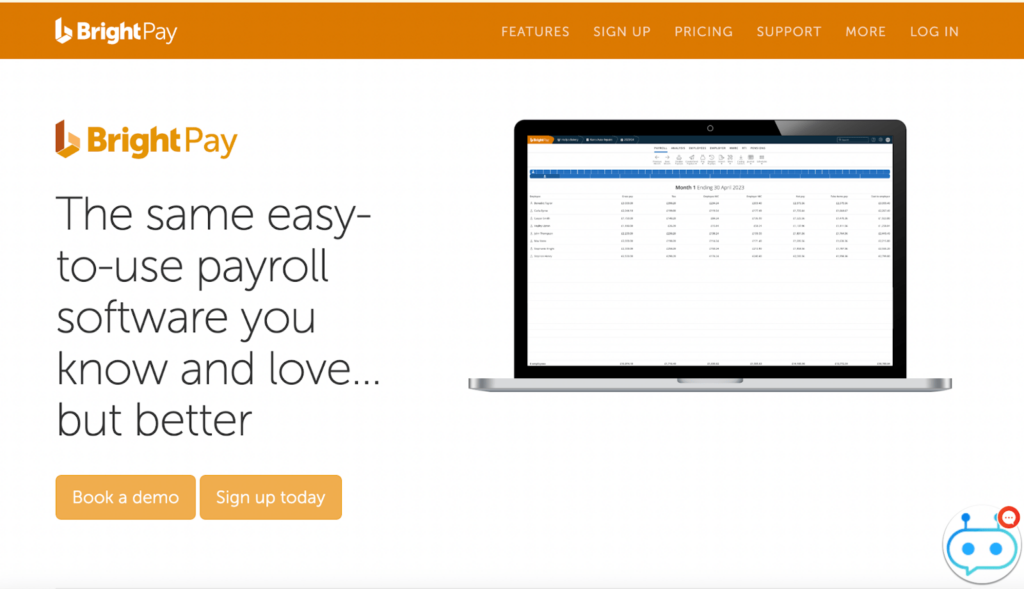
BrightPay is a versatile payroll software that supports a variety of payment schedules. With this UK payroll software, you can create pay stubs, integrate with your accounting software, and stay compliant with HMRC.
Two pros and a con:
- Pro: BrightPay adapts well to various business needs. Users get customizable pay stubs, helpful integrations, reporting features, and multiple pay schedules.
- Pro: BrightPay excels in HMRC payroll compliance. It automates your RTI submissions and ensures data safety with encryption and cloud storage.
- Con: The only real downside is BrightPay’s ambiguous pricing. You have to enter company details for quotes, which makes it hard to compare packages.
BrightPay is flexible, adapting to the needs of all sorts of businesses—whether they have complex payroll requirements or not.
As promised, this UK payroll software excels in compliance. Specifically, BrightPay is RTI compliant, creating FPS and other submissions automatically throughout the year. It stores HMRC logs and alerts users of any submission errors in a simple format to help employers meet UK payroll rules.
The software is now available as a cloud solution, which is ideal for teams working from different locations or from home. A furlough pay calculator and integration with pension providers helps to streamline processes.
BrightPay integrates with Modulr for direct employee payments. It also includes a Construction Industry Scheme (CIS) module for subcontractors. It encrypts sensitive data and offers password protection for employer files stored in the cloud.
Setting up BrightPay is easy. Employers can migrate their payroll data from other software with help from BrightPay’s customer support. (Which, by the way, is impressively responsive and helpful. You can reach the customer support team by phone or email.) And with BrightPay Connect, users get a secure cloud backup, an employer dashboard, and a self-service portal for employees.
That said, you can only use BrightPay Connect if you download the desktop version of BrightPay. This might change, but it’s part of the limitations that come with the cloud version of the payroll software. Another limitation? You can only have up to 250 employees with the cloud version.
Aside from this, there really aren’t any drawbacks to using BrightPay. There’s a reason it’s our top choice, after all. If we had to pick something, we’d say the payment options aren’t easy to figure out. There’s no straightforward list of pricing plans. Instead, you have to enter details about your company to get a quote.
BrightPay Pricing
This UK payroll software offers both annual and pay-as-you-go pricing. To see how much the plan might cost, you must enter the number of employees you have. For 100 employees, BrightPay costs £1051.20 a year—equal to £87.59 a month. If you wanted to pay for 100 employees on a month-to-month plan, you’d pay £103.55 each month.
The billing options section of the pricing page is where it gets confusing. The pricing quote you get when you use the calculators is all-inclusive, but there’s no readily available feature list. It’s unclear whether things like BrightPay Connect are included in the price the calculators come up with.
2. Sage – Best for Employee Rewards and Recognition
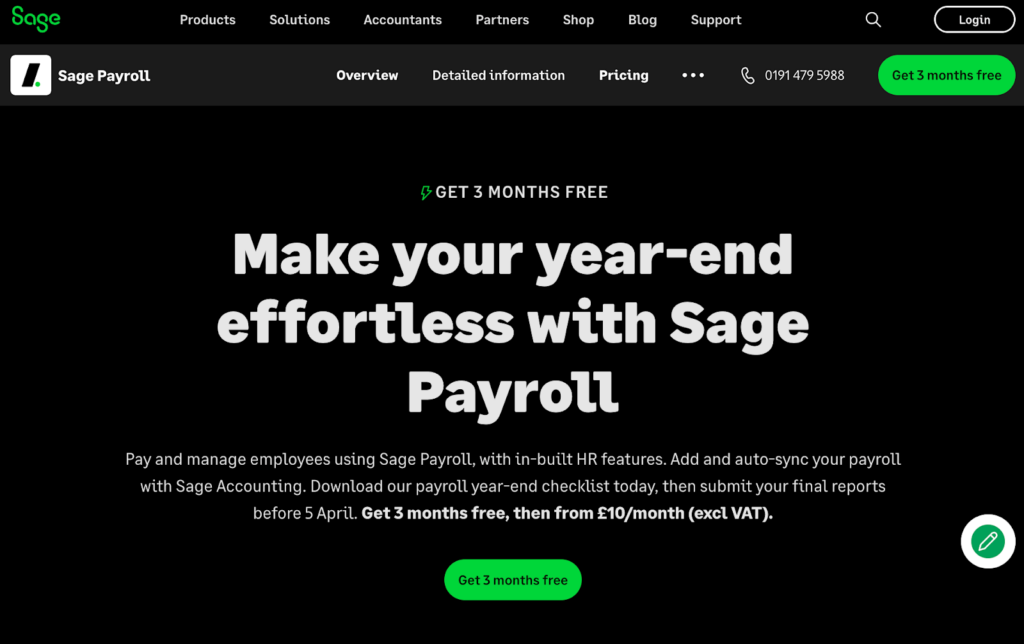
Sage Payroll offers a cloud-based payroll system for small businesses, making it easier to manage and pay employees. It includes HR functions like leave management and integrates with Sage Accounting. The service supports various payroll tasks and ensures compliance with HMRC laws. And if you want to set up a rewards program to make your workplace a little more fun for employees, you can.
Two pros and a con:
- Pro: Sage Payroll offers customizable add-ons like HR integration and unique employee rewards, making it stand out in the UK market.
- Pro: Features include 24/7 support lines, on-demand telehealth, retail discounts, financial rewards, and a Cycle to Work program.
- Con: While Sage Payroll simplifies compliance and enhances user experience, the cost of add-ons can be high for larger teams, potentially making it less affordable.
Sage Payroll streamlines small business payroll and offers several key add-ons, which is nice. If you don’t need things like HR integration and employee rewards, you don’t have to pay for them. But they’re there if you want them. And we think the rewards system is pretty cool. For one thing, it’s unique—you don’t often see payroll software with a focus on showering your employees with a little extra love.
With Sage, you can offer employees:
- A 24-hour support line to discuss legal matters, debt, relationships, and mental health.
- On-demand telehealth appointments with prescriptions sent straight to a pharmacy of choice.
- Discounts on gas, vacations, and hundreds of popular retailers like Tesco, Morrisons Supermarket, and IKEA.
- Direct financial rewards to recognize a job well done.
- An optional Cycle to Work program complete with discounted bicycling gear from Halfords.
Pretty cool, right? In the UK, things like health insurance and retirement are already required. It’s not like in the United States, where employers can use those things to draw in top talent. So a benefits program like this helps employers stand out from the crowd.
Finally, Sage Payroll simplifies compliance, automates pension enrollments, and offers a user-friendly experience. When you sign up, you’ll get these features:
- Invoicing: Easily create and track personalized invoices and send reminders with a click.
- Link your bank accounts: Automatically import bank transactions and apply rules.
- VAT calculations: Simplify Value Added Tax (VAT) calculations and submit the tax directly to HMRC.
- AI-powered tools: Use AI to automate data entry and capture data straight off invoices and receipts.
- Dashboards: Visualize your monthly cash flow with a detailed dashboard.
- Reporting: Generate comprehensive reports for business performance and planning.
- HR tools: Manage payroll and HR, including leave tracking and electronic document management, with auto-sync to Sage Accounting. It costs a little extra per month, but it’s worth the price.
One minor complaint about Sage? The price can get a bit high with all those add-ons. If you have a smaller team of 10 or 20 employees, you can probably get all the add-ons without feeling the pinch in your bank account. But otherwise, HR and benefits add-ons can get expensive.
Sage Pricing
Sage Payroll’s mid-tier plan starts at £20 per month for 5 employees, but this price does not include the 20% VAT you’ll have to pay. Each additional employee costs £4 a month. The plan gets you HMRC RTI capabilities, employee recordkeeping, and leave tracking. But if you want time tracking and reporting, you’ll have to get the Premium plan. It costs £30 a month excluding the 20% VAT.
The Sage Employee Benefits program starts at £6.30 a month for 25 employees.
Sage offers a free, three-month trial on all its payroll products.
3. Citrus HR – Best Personalized Service for Small Businesses
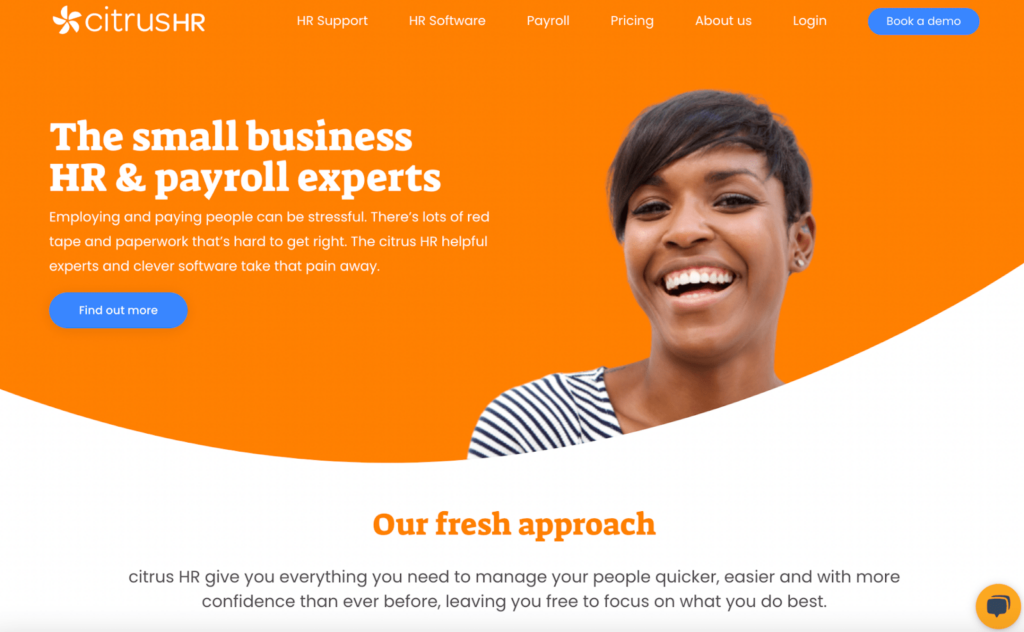
Citrus HR’s payroll software offers personalized payroll services for small businesses. With the payroll service, you’ll get features like automated pay stubs and deduction calculations. If you only need minimal payroll services, you can stick with Citrus Payroll alone. Or, you can get it as an inexpensive add-on to the full HR software suite.
Two pros and a con:
- Pro: Citrus HR’s payroll software automations significantly reduce the time needed for payroll tasks
- Pro: Offers full phone support and even a full-service package if you want to make Citrus your HR team (without adding them to your salary).
- Con: The main drawback is you must get the HR Software-Only package if you want the payroll features, and there’s an extra cost per user, per month.
Citrus HR’s payroll software is a cloud-based solution. It’s designed to ease the headaches and time demands of running payroll for your small business. The company promises to make payroll take less time than it takes to brew a cup of coffee. From our research, it seems to live up to that promise—after the initial setup period, anyway.
Part of the reason for this is Citrus HR’s focus on automating all the most time-consuming tasks. Here’s what you can automate with Citrus HR:
- Taxes
- National Insurance payments
- Pension calculations
- RTI submissions to HMRC
- Generating and distributing pay stubs
- Handling forms like P11Ds, P45s, and P60s
- Paying staff through integration with payment platforms
So not only do you get a fast and efficient payroll system, but you also get one that automates most of your compliance-related tasks.
Best of all, there’s full phone support if you run into any hiccups.
The downside here is the payroll service is only offered as part of either the HR software or HR support package. But that HR support service is an excellent choice for small businesses. It’s like having a little HR team in your corner without having to pay a bunch of salaries you can’t afford. It includes:
- Employment contract creation and employee recordkeeping
- Dedicated HR professional to provide unlimited support for any issues, like employee disputes, redundancies, discipline, family leave, and TUPE transfers
- Holiday and absence management
- Compliance-related notifications to tell you when documents need renewal
- Payroll software
- Reporting capabilities
- Onboarding
- GDPR compliance tools
None of Citrus’s products require you to sign a long-term contract. If you’re unhappy with them, you can quit with 30 days’ notice.
Citrus HR Pricing
Citrus HR Payroll is offered as an add-on to either an HR Support or HR Service package—it doesn’t look like you can get it on its own.
Here’s the pricing breakdown:
- HR Support: £8 per employee plus a £50 flat fee each month (excludes the price of VAT). The payroll add-on is £1 a month per payslip.
- HR Software-Only: £2.50 per employee per month, VAT excluded. The payroll add-on is £1 a month per payslip.
There’s a 14-day free trial for the software, so you can test-drive it before you make a decision. Explore more on Citrus HR’s pricing page.
4. Octopaye – Best for Big Businesses with Lots of Employees
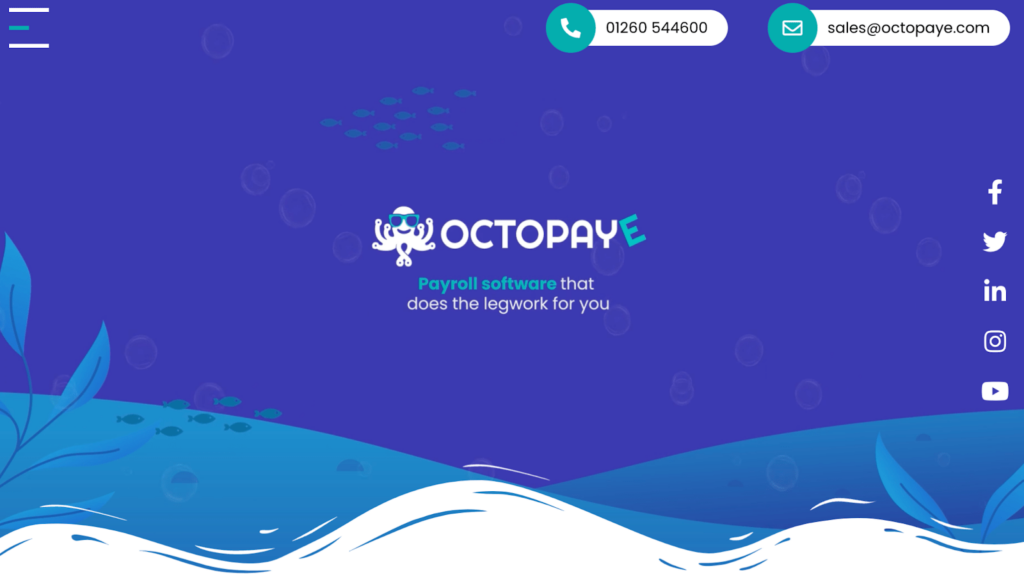
Octopaye is a UK payroll platform for recruitment agencies and companies. It’s specifically built for businesses with complicated payroll needs. Octopaye handles various payroll models, like PAYE and Umbrella PAYE. While it’s a newer software service, the HMRC gave Octopay the stamp of recognition in 2019 and it’s been going strong ever since.
Two pros and a con:
- Pro: Octopaye offers a suite of features for managing payroll for all types of employees across multiple locations. The option to white-label payslips and employee portals reinforces brand consistency.
- Pro: The software partners with multiple third-party providers for document storage, pensions, and banking. This helps round out the HR experience.
- Con: There’s a lack of clear pricing information on the website or even an explanation of how pricing works.
Don’t let the bubbly, cartoonish look of Octopaye’s website fool you. The software gets down to business when it comes to handling complex payroll needs. It essentially acts as an umbrella that ties all your payroll, accounting, and HR processes together.
Octopaye provides the payroll. Its third-party integrations with document storage, pension, and banking providers fill in the rest.
Of course, this can be a downside if you’d rather get an all-in-one payroll, accounting, and HR software. But if you have a large company with full-time employees, part-time employees, seasonal workers, and contractors spread out across multiple locations?
Then you’re going to want Octopaye. You can:
- Manage communications with contractors and employees
- White-label all pay slips and employee portals with your own logo and branding
- Collect contracts, right-to-work, and other paperwork via the portal
- Share information and documents with employees through the portal
- Use Octopaye partners—Xero, Remus Rewards, Trust ID, Text Marketer, Smart Pension, MyDocSafe, and Icetrak—to round out your HR experience
- Enjoy HMRC approved and fully UK-compliant payroll software
One downside is that there’s no easy way to see how much Octopaye costs.
Octopaye Pricing
Octopaye reportedly charges a per-user price, like most payroll software. To learn more, contact the Octopaye sales team directly.
5. Mercans HR Blizz – Best for UK Employers with Global Employees
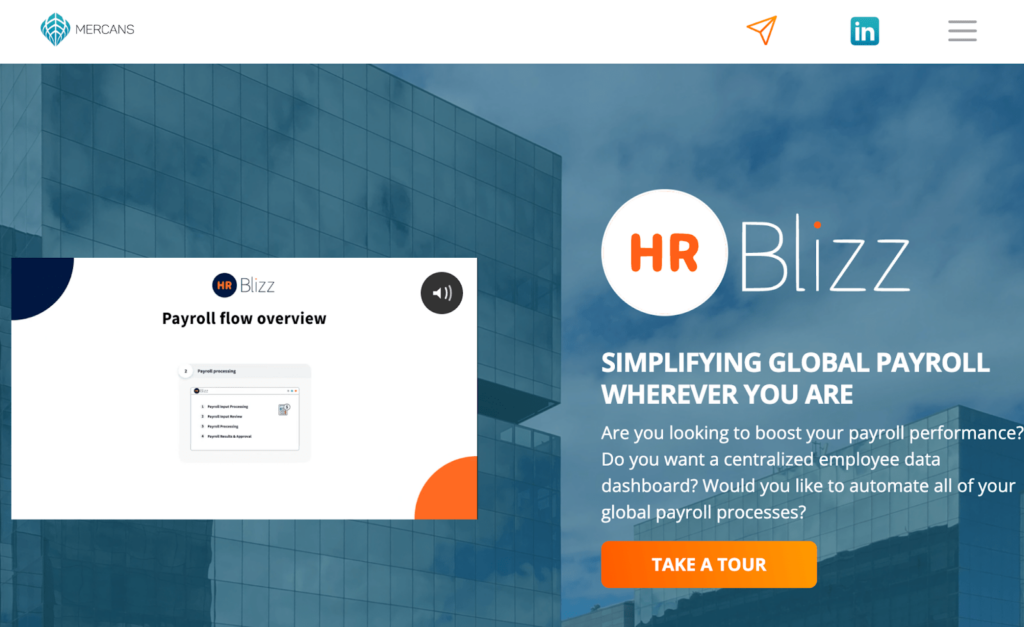
HR Blizz by Mercans is a cloud-based, proprietary SaaS suite that automates global payroll processes and centralizes international employee data management. All payroll and employee information is brought together under the HR Blizz roof. This secure interface allows real-time access from anywhere in the world, and on any device. If you need error-free salary delivery across different languages and currencies, HR Blizz is for you. And yes, it’s recognized by HMRC too.
Two pros and a con:
- Pro: HR Blizz automates complex payroll tasks across over 160 countries. It’s also HMRC compliant, which makes it excellent for UK employers with employees at home and abroad.
- Pro: The platform provides a suite of payroll management tools, including automated payouts, statutory filings, and user-friendly dashboards.
- Con: The lack of transparent pricing for HR Blizz is frustrating but not unexpected. You’ll have to reach out to a rep to find out how much it costs.
Mercans offers three separate products to support different needs. With HR Blizz, you get a cloud platform that automates payroll operations over 160 nations, languages, and currencies. For more support, you can outsource your payroll to Mercans or use it as an employer of record.
These options are ideal if you’re a big business with an even bigger budget. But for many of you, HR Blizz alone works just fine. The global payroll self-service software comes with:
- Automated salary and tax calculations
- Automated payouts
- Pay editing functionality (up until payday)
- Statutory filings and payments
- User-friendly dashboard
- Secure recordkeeping
- Leave management
- Time tracking
Frustratingly, though, it’s impossible to know how much HR Blizz costs unless you speak with a sales rep.
Mercans HR Blizz Pricing
Reach out to the sales team to learn how much HR Blizz would cost for you.




